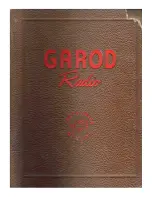
S R A / S F X 2 1 0 0 S E R I E S S A T E L L I T E R E C E I V E R
154
•
Avoid excessive humidity, sudden temperature changes or temperature extremes.
Dew may form inside your unit.
•
To avoid costly damage or injury, place your unit on a solid, stable surface or
mount in a rack free from vibrations. Do not place any heavy objects on top.
Exterior Equipment Installation
Refer to Figure C-1 while reading the instructions below.
•
Grounding the dish provides protection against static voltage build-up, which
may damage equipment. Grounding also provides some protection against
surges induced by nearby lightning strikes. Any coax cable that may be
exposed to lightning or power conductors must have its outer shield grounded.
There may be additional grounding regulations in your area. It is important for
you to consult and follow all the codes and regulations in your area as you
install your system.
•
The best method of grounding the outer shield of a coax cable is to use a
ground block. This block is a barrel connector to which you can install a
ground conductor, such as a terminal, or a drilled hole and setscrew. The
terminal is where the outer conductor of the coax cable is attached to the
grounding electrode. When installed, the grounding block passes the LNB
signal and DC voltages straight through while grounding the outer conductor of
the coax. One factor determining the ground block location is the location of
an acceptable ground electrode. The grounding conductor (the wire that runs
between the ground block and the ground electrode) must be in a straight line,
if possible from the ground block to the grounding electrode. Also, splices in
the conductor between the electrode and the grounding block are prohibited.
•
Where coaxial cable is exposed to lightning, the cable shall be connected to
the grounding system of the building, as close to the point of cable entry as
practical. This can be either inside or outside the building. Therefore, when
selecting a location for the grounding block, try to make the ground close to
where the cable enters your building.
•
The size of the grounding conductor that connects to the ground electrode is
to be at least No. 10 copper wire or No. 8 aluminum wire. Insulation over the
conductor wire is not required. As with any cable, the grounding connector
must be securely fastened to a surface to protect it from physical damage. If
the conductor cannot be protected from damage, the size of the wire should
be increased to withstand any physical strain placed on it.
•
Acceptable ground electrodes are: Grounding Interior Metal Water Piping
(cold water), Grounding Rod (must be driven at least 2.44 meters (8 feet) into
the ground) and Grounded Metallic Service Raceway.
•
The outdoor antenna to be earthed in accordance with National Standards.
Operating & Cleaning
•
The unit should be placed in a sheltered location away from sources of water, heat,
extreme cold, vibration and electromagnetic interference.
















































